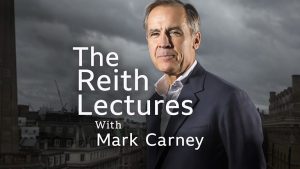‘How we get what we value’: In this difficult December
On Saturday, the 12th December, I went up into the loft to get down the Christmas decorations. Unsure as to whether I’d get it all sorted in a day, I started with the wreath on the door. Then, if I failed in my task, the neighbours would assume all was tickety-boo. Note to self: all decorations must come down by the evening of Wednesday 6th January, Epiphany. As you see, I’m a stickler for tradition.
The wreath set me thinking about December’s series of Reith lectures on BBC Radio 4, which I’ve been following on Wednesday mornings – one of the advantages of working from home. First  broadcast in 1948, the annual event was organised to recognise the contribution to public service broadcasting of the first director-general of the BBC, Lord Reith.
broadcast in 1948, the annual event was organised to recognise the contribution to public service broadcasting of the first director-general of the BBC, Lord Reith.
This year’s lecturer, billed as a ‘rock-star banker’, ‘the outstanding central banker of his generation’ and the ‘man with the most comprehensive book of contacts in finance’ is…Doctor Mark Carney – I kid you not. His focus is on the current triple threats: credit, Covid and climate.
The series of four lectures is titled: ‘How we get what we value’, and focuses on the relationships between financial values and human values, how these are related but distinct, and the paradoxes we live with. Like: water versus diamonds, Amazon the retailer versus The Amazon, and care workers and their precarious working conditions.
The first lecture, ‘From moral to market sentiments’, is, in his words, ‘’a journey from grotto to Glasgow’’ – particularly appropriate for this time of year and the UN climate change conference next year. From Scottish enlightenment and Adam Smith, the beginning of a market economy and one which produces prosperity.
Lecture two was ‘Credit crisis to resilience’, and three ‘From Covid crisis to renaissance’. Fourth, to be broadcast at 09:30 GMT on Wednesday the 23rd December, will be on the subject of ‘From Climate crisis to Real Prosperity’.
The audience, which has a chance to pose questions, includes luminaries like Alistair Darling, George Osborne, several University professors and plain normal radio listeners. I think you’ll find it worth listening to.
Link to series: https://www.bbc.co.uk/sounds/search?q=reith+lectures
Tags: Climate, Covid-19, Credit, Morals, value
The views and opinions expressed on the STA’s blog do not necessarily represent those of the Society of Technical Analysts (the “STA”), or of any officer, director or member of the STA. The STA makes no representations as to the accuracy, completeness, or reliability of any information on the blog or found by following any link on blog, and none of the STA, STA Administrative Services or any current or past executive board members are liable for any errors, omissions, or delays in this information or any losses, injuries, or damages arising from its display or use. None of the information on the STA’s blog constitutes investment advice.
Latest Posts
- How I Used Dow Theory to Strengthen My Market Convictions June 20, 2025
- The New Monetary Order: Russell Napier on Inflation, Debt, and Financial Repression June 12, 2025
- Why I Became (and remain) a Member of the STA May 29, 2025
- The Emotional Rollercoaster of Markets: Why Bubbles Repeat and How to Outsmart Them: Summary of Kim Cramer Larsson talk May 14, 2025
- Avoid Overusing Indicators: Streamline Your Trading Strategy May 7, 2025




















Latest Comments